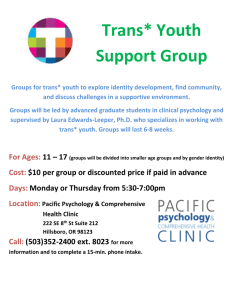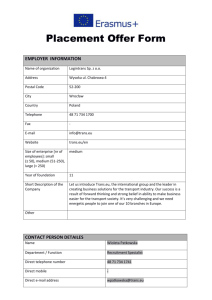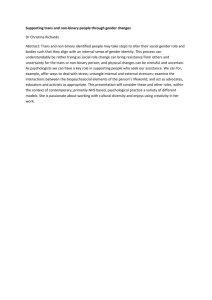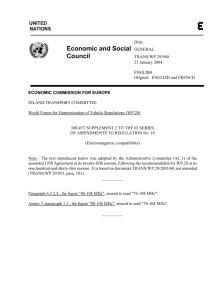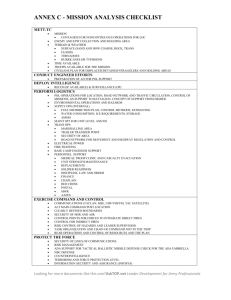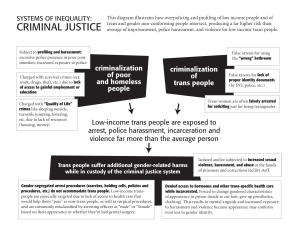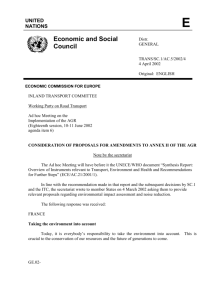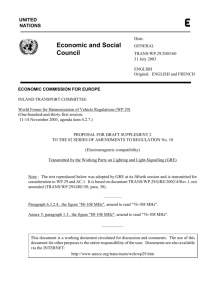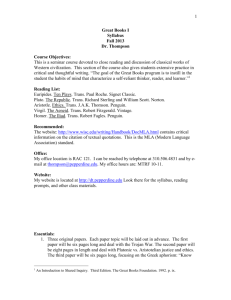Southerners On New Ground REPORT
advertisement
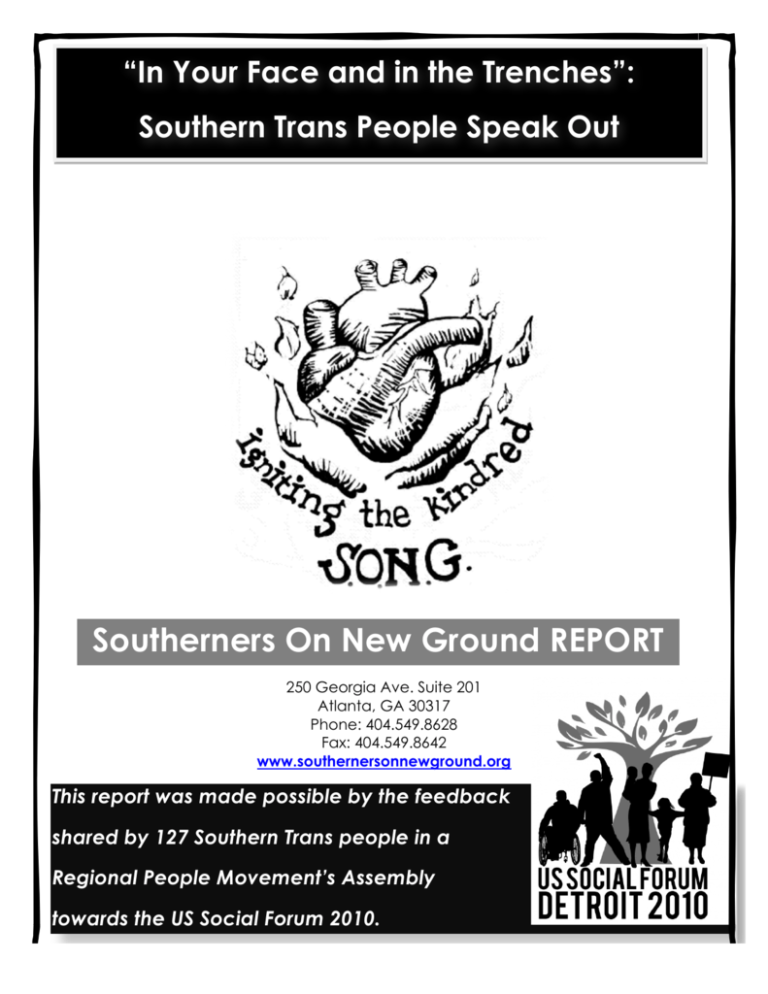
*www.southernersonnewground.org* “In Your Face and in the Trenches”: Southern Trans People Speak Out Southerners On New Ground REPORT 250 Georgia Ave. Suite 201 Atlanta, GA 30317 Phone: 404.549.8628 Fax: 404.549.8642 www.southernersonnewground.org This report was made possible by the feedback shared by 127 Southern Trans people in a Regional People Movement’s Assembly towards the US Social Forum 2010. *www.southernersonnewground.org* “IN YOUR FACE AND IN THE TRENCHES”: SOUTHERN TRANS PEOPLE SPEAK OUT Welcome to SONG’s report on our Southern Trans people’s Survey/People’s Movement Assembly. In concert with the US Social Forum, SONG set out to listen more deeply to our Trans base, membership and Trans Southerners living outside of the South. Listening campaigns have always been a core part of SONG’s strategy: prioritizing listening to marginalized and oppressed communities to honor them with hearing and dignity; analyze conditions; find patterns; and take action based on that information. (For more information on SONG and who we are, visit: www.southernersonnewground.org) SONG was founded by Black and White Lesbians in 1993, and has worked (over its political evolution) on centering voices that have been marginalized; and that has meant taking concrete steps to not only include “Trans voices” but also create real processes that build power, leadership and self-­‐determination for Trans people and gender non-­‐conforming people in SONG. This work is one of our steps in that direction. It is a summary of stories and information, and it was anonymous. However, in the interest of giving the reader a direct relationship to the true voices of the people who shared with us, we include anonymous quotes throughout, wherever possible. Who Answered the Survey This survey was answered by 127 people who identified in the largest numbers as Transwomen, Transmen, and Gender Queer, as well as Two Spirit, Cross dresser, passable, Autogynephile, Non-­‐op Transsexual, Women, and Men. The survey asked for information from Trans and Gender Non-­‐ conforming people who lived or have lived in the South. Sixty-­‐two of the participants were white; 65 were identified otherwise in terms of race. Thirteen identified as Black; and everyone else identified in very specific otherwise specified ways. Eleven identified as people with disabilities. Seven identified as immigrants. Four identified as non-­‐ Christians, specifically. Five identified as Native American. In terms of age, 21 participants were under age 25; 36 participants were between 26 and 35; 20 participants were between 36 and 45; 25 participants were between 46 and 55; 17 participants were between 56 and 65; and 7 participants were between 66 and 75. In terms of class, 9 participants identified as upper middle class; 38 participants identified loosely as middle class; 34 participants identified as working class; 35 identified as low income; 3 identified as students; and in addition to other class identifications 6 identified as on disability money from the government/SSI. In the class section, people shared a lot of information, here are some of their quotes: *www.southernersonnewground.org* ““My family was middle class, but [I] was disowned as a teenager and forced to figure out a way to get by with no resources.” Many participants described having to “piece together a living” with many different kinds of work: 2 identified as truck drivers, 2 identified as sex workers, 2 said they currently or formerly were dealing drugs, and most said they saw their “on-­‐going struggles with unemployment as connected to discrimination.” “I'm an artist, hustler/escort, porn actor, weed dealer, bath house front desk receptionist, dog walker, phone sex operator and other odd jobs. California is expensive!” (From a participant who moved to California because of lack of safety and jobs in the South.) We noted that there was a definite and concrete connection made between disability and poverty: participants wrote openly about how ableism and transphobia worked against them jointly in their lives. As stated below, a recurring pattern for Southern Trans people is not only discrimination but also rural isolation as contributing to poverty and unemployment, among other factors. “I was middle income before moving to Mississippi, have been unable to find work as I was supporting my partner until she passed away in October, have since lost my home, and have moved to Georgia to stay with my step-­daughter while seeking work.” In terms of location, the participants were from many places and ranged from having lived in the South 9 months to 49 years. Some had moved a lot within and outside the South, and some live in the Southern communities they have lived in their whole lives. Thirty-­‐six participants live in rural communities and small towns; 38 live in cities; and 58 live in medium sized towns. The majority of participants live in North Carolina, Virginia, Georgia, Florida, Alabama, South Carolina, and Tennessee. There were also small groups of folks living in Kentucky, DC, Massachusetts, California, and West Virginia. There was 1 person each living in Maryland, Pennsylvania, Ohio, Nebraska, Texas, Arizona, and Mississippi. What are the 3 Most Pressing/Key Issues to You and Your Community? The participants were asked to name their top 3 most pressing concerns, and many answered with stories. By far, there were 3 issues that participants named as most important: Employment/money, Violence and Safety, and Access to healthcare. Additionally, there were very strong patterns in folks’ answers; people had a lot of similar stuff to say. We split the response into 7 areas; Safety, Isolation, Respect/Societal Acceptance and Discrimination; Ignorance; Employment; Access to Healthcare and Other Services; and Building Trans Communities from the Inside. Wherever possible, we used the words for people’s experiences that they used themselves. *www.southernersonnewground.org* Safety “The most pressing issue for me is my chest and being able to not be outed in the street. I don’t live in a nice area with nice people. I live in an area where most people didn’t graduate from High School. Not only that, I have a feminine face. I feel as though if I get in trouble and I call the cops that they will trip on me because of how I look and my ID saying F and my name is male.” Folks named safety as a concern in their everyday lives: in bathrooms, schools, and at work. Most answers described it as a constant and daily concern, and there was considerable concern (with many concrete reasons named) around being the target of hate crimes and bullying. “I want to live in peace.” Isolation “Well for me, I don’t have any (issues) because I stay in the house all the time. There no where to go here, and don’t know anyone who is a trans here, so I have to put up with my wife all day. We have a roommate who is gay but don’t know about me as a Tman.” The quote above speaks to a reason for the existence of SONG, as this is not an unusual story for our membership and base. People named closetedness, family issues, and exclusion from LGB communities and other communities as key factors in isolation. They also named the reality of Trans people being isolated from each other, lack of potential sexual and romantic partners, and lack of Trans networks as key problems. There is also a general lack of visibility of Trans people in the South and rural communities generally. There was a very strong and reflective analysis of how rural and conservative conditions of the South have led to lives being this way for so many Southern Trans folks. “…lack of resources and for the same reason most Southern Trans end up running to the north because they have more/better resources.” “…no one seems to know that we are in the 21st century and we don't need permission to live.” Respect/Societal Acceptance/Discrimination “When I moved here, I filled out over 40 job applications for work I was qualified for (with a college degree). I disclosed my trans identity at the interview. I was told at two of the interviews I got that they wouldn't hire me because "we don't want your kind of people to be the face of our company." Three months of looking, and I finally found a job working 10 hours a week for $7/hr.” *www.southernersonnewground.org* “I have actually worked at a job that stated in their handbook that anyone dressing as Trans would be subject to immediate dismissal.” Overwhelmingly, folks named employment discrimination as key. Many people gained employment because they could pass temporarily, but they lived in fear of being outed and losing their jobs. Discrimination at schools is also a huge problem named as well as harassment in day-­‐to-­‐day life. Racism, classism, and discrimination against Trans people by Lesbian, Gay and Bisexual people were also named as problems. In particular, interactions with police and prisons, discrimination while working for sex workers and traders, and discrimination in drug-­‐related run-­‐ins with police were areas of life that folks said discrimination was particularly bad. Also, people in small communities discussed discrimination against their whole families: “Religious people… they taught their children to attack my daughter when she was in school in sort of a trans-­bashing by proxy. She was horribly attacked and the principal was the one cheering them on. I had to have her transfer schools, then I was told she wasn't welcome there either.” Finally, vicious hate was named as pouring from the most aggressive of Southern Christian religious communities. In many small towns, some churches hounded Trans folks so badly that they have made it hard for folks to stay in their communities. In SONG’s analysis this goes way beyond individual instances of harassment, and speaks to the larger web of human rights violations of LGBTQ people in the South, who are denied the right to come home and stay home in the South safely and with dignity. This analysis helps us understand our work as a region in a way that leads us to developing regional organizing that prioritizes networks and deep relationships and connections; to build the kind of infrastructure capable of taking on this situation. Additionally, many traditional fears and stereotypes of gay people have been placed on Trans folks, as seen below: “No access to jobs, as soon as they see you are Trans they run. I was turned down for a job at a community college for which I was the only candidate because they were afraid I would corrupt the children.” Ignorance Even within communities where many Trans folks have lived a long time, and where some participants had faith that people could be accepting, people reported a deep ignorance of Trans peoples’ lives and realities. Many people felt that they were the only Trans person that many people in their communities had ever met, and that most people they knew did not even know what Trans meant. Employment and Money *www.southernersonnewground.org* “A lot of us didn't finish school, so that plus employers being transphobic and not being able to get proper ID documents and a lot of other things means most folks really can't get jobs. Which means no house and no food. And that plus cops being transphobic means we're probably going to get arrested for something, or we're going to have to work in really unsafe conditions like doing street work.” The quote above speaks to the cycle that many folks named: not being able to find safe work, or work at all, was named clearly as the root for many of the main problems named by participants. Access to Healthcare and Other Services “Very basic things that most people take for granted, such as physical safety, shelter, and health are not only unavailable to some.. they are specifically and intentionally denied.” One of the most basic ways that participants named their human rights being violated was intentional lack of access to legal, health, housing, HIV, and youth resources. In particular, 11 participants named lack of access to legal documents as a huge issue, but overall the most attention was paid to lack of healthcare. People described everything from lack of research and access to humane and relevant surgeries-­‐ all the way to being denied care for cancer and asthma. Many participants had not seen doctors in years and needed to badly, or reported waited months and spending a lot of money to drive to a clinic in Atlanta for Trans-­‐friendly healthcare. Building Trans Communities From The Inside “…the fact [is] that being brought up here makes me feel very ashamed of what I am, and I can't really shake that feeling.” “It is very hard to dissolve the crust of lies and denial with which we have protected our most intimate core being, but it has to be done. As long as we believe the lies that other people tell about us, we cannot recognize ourselves.” Many participants talked about the need to build self-­‐love and self-­‐acceptance within Trans communities and heal from the shame of oppression. This was seen as a root cause of suicide and lack of unity in Trans communities. Many clear voices in the survey openly stated that there is a clear need for leadership development and organizing in Trans communities—Trans people organizing themselves and Trans people not being isolated from organizing communities and networks generally. Another problem named as connected to a lack of self-­‐love was a tendency (named by 3 participants) for Trans communities and other communities to “police gender” in Trans communities—it felt to some like there is a lot of pressure to conform to “passing” or “full transition”. Of course, this was also seen as connected to discrimination and survival strategies for Trans people: *www.southernersonnewground.org* “Too often we must live closeted lives or successfully pass as a femme woman or masculine man, or else we cannot find employment and adequate housing.” Overall, all the conditions named portrayed a pattern of intense oppression, as well as resiliency, and a cluster of concrete shared concerns, that set the stage for strong opportunities for community organizing. What are the 4 top first steps towards solving these problems? There were many insightful and important suggestions about how to begin to tackle the key issues named. There were roughly 4 core strategies suggested: • • • • • Policy Change (making laws, enforcing of these laws, etc.) Organizing (within Trans communities and building bridges with other communities) Public Education Creating and Accessing Resources While there were many different suggestions around these different strategies and how to focus them, there were 3 areas that were spoken to a lot: building Trans support and networks; Employment protections on a policy level; and education in workplaces, schools, etc. We divided them into 4 core strategies to help address the variety of different folks were thinking about how the much-­‐needed changes in our region can be made. Policy Change “…Equal access [to] housing, employment, and safety-­-­without such opportunities, how are people to become stable and successful? Without such opportunities we are unable to find a decent job, make a decent living, obtain health insurance, find and pay for doctors of any kind, etc., and this leaves us vulnerable and exposed to a lot of other problems -­-­ criminal activity to gain an income, but then once jailed, where do we end up in prison and are we safe? -­-­if we are homeless, what shelters do we turn to?” Participants saw a strong need for both making new laws, and enforcement (or policy accountability). Like most Southerners, the participants recognized that the making of laws that are not then carried out in small communities and rural places are meaningless to most of our lives. People told us accountable policy is needed around: non-­‐discrimination in workplaces, schools, housing, healthcare facilities, and bathrooms. Additionally, there is a need for policy that will decriminalize sex work; create universal healthcare; insurance reform; fighting hate crimes and bullying; and legalization of self-­‐determined legal documentation (having ID’s that fit how we *www.southernersonnewground.org* identify ourselves, not to fit who we are told we are). Finally, it was very important to many participants to see laws not just on the national level but also in the states, towns, and counties where we live. For many Southerners it is on these levels that we feel we have the best chance of actually achieving protections and accountability for our communities; because we so often do not see much “trickle down” of national law making. Organizing “.. this community is in CRISIS, and you've got to start with the basics, the needs of the most marginalized among us-­ that is, Trans people who are poor and/or disabled.” Building power to make change (community organizing) was seen as very important as well. The need there was split into 3 main areas: Building internal Trans unity, networks and spaces; Coalition-­‐building and organizing alliances across different communities; and individual targeted campaigns. • • • Participants said there is a great need for listening to Trans folks; gathering information; and increasing the visibility of Trans people. A need for strengthening existing conferences and convergences (like Southern Comfort Conference) and building new spaces to come together; and to centralize Trans resources into databases and through creating Trans-­‐led media. There is a great desire, spoken to in this survey, to build support structures that can heal internalized oppression, develop trans leaders as organizers, and support Trans elders and youth. Finally, there was some desire for targeted organizing of groups within the broader Trans community: specifically, Transwomen sex workers; Trans people in rural and small communities; and incarcerated/formerly incarcerated Trans people. There also was a sentiment that there must be organizing across communities; voices here said they do not want to be isolated from other oppressed communities organizing. Specific suggestions included: organizing with clergy, through listening campaigns, with LGB folk, with lawyers, doctors, and having Christians organize Christians. Interestingly, there was also some sentiment that SONG itself was the “first step to solving these problems”, which while incredibly humbling, also speaks not just to the importance of SONG, but also to the limited organizing resources for our communities. There were also a small array of other organizations named as potential allies to help build bridges and collaborations through collective organizing, and convening people across communities together. There were also several specific ideas for different kinds of direct campaigns. Ideas included: Public boycott of Jerry Springer; Trans Coming Out Day; fighting for better surgery options; organizing against the American Medical Association’s classification of Trans people as diseased; boycotting anti-­‐LGBTQ churches and businesses; and fighting for marriage rights for all. *www.southernersonnewground.org* Public Education This strategy was divided into two parts: creating broad public education campaigns that would speak to schools, churches (including Black churches specifically), other religious institutions, and LGB communities. These campaigns would be broad and creative; and would also target sites as specific as sexual education classes in public schools, and addressing transphobia and racism in PFLAG chapters. It would organize supportive media creatively to gain traction. The other part of the thinking presented in the survey was around targeting gatekeepers in specific institutions to change them and their problematic actions towards Trans people. Those targeted would be healthcare providers; school administrators and teachers; police; therapists; policy makers; and leaders of individual companies/employers. It also must be said that some folks thought that police and prison staff could not be worked with. But, instead that the entire prison industrial complex (system of prisons, profits, and forced labor that feeds the US) must be taken apart in order to really liberate Trans people from an oppressive relationship with prisons and police. Creating and Accessing Resources Participants wrote passionately about the need for more resources for Trans people, particularly around medical needs, housing needs, legal support, and employment support. Specific ideas included: free hormones, free healthcare, transitional housing sites, listings of Trans-­‐friendly employers, and trans-­‐focused Jobs training. Specific Resources and Support Needed? “SONG's mission is to connect the south. I suggest you work hard at connecting all localities into a network where we can share information and resources In other words, pick up from SONG's organizing school and help connect us. It's a natural.” We also included a question about if there were very specific resources, support or tools that would be helpful to Trans Southern communities. There was a wide variety of responses. However, there were 2 main trends. First, the need for more directories of resources and groups that are also accessible for closeted people (including information on legal services, clinics, break downs of which states have Trans resources, and resources for Trans parents and kids). The second was a specific request from SONG-­‐-­‐for SONG to work “more to scale”—grow bigger, and hold annual gatherings. There was also a general sentiment that folks want more voice in LGBT organizations; and more access to skills, trainings, and organizing networks. Moving Toward The South Our Communities Deserve *www.southernersonnewground.org* “I love the South and I love trans people-­ I am *so* excited by this effort to highlight issues for Southern Trans folks.” “I like that SONG's gone to regional chapters, and I think expanding and developing the chapters would provide a good foothold for people if they wanted/needed to move to a different place in the South etc.” SONG has much gratitude to the 127 people who took the time, and most importantly, had the faith, that participating in this survey was worth their time. SONG knows that the history of many LGBTQ organizations has been to silence, ignore and exclude voices of Trans people. We know that to work differently takes time to build trust and a commitment to supporting leadership of Trans people specifically. We were sure that we would be transformed and moved by what we learned in this survey, and yet we are still incredibly humbled by the clarity of the problems facing the communities learned from here, matched toe to toe with a clarity and creativity about possible solutions, conveyed with such resilience. We felt that the voices here, in a large part, reach their own conclusions; and so we have only added where we felt we could bring insight to patterns, larger conditions, and historical trends. In terms of how SONG relates to this information: when we know more, we must do more. We are committed to honoring what we have learned here as we move forward in our new strategic plan. For more information about SONG and our new work, contact us at www.southernersonnewground.org SONG wants to thank BT McKenzie for all of his hard work on this survey and report; and all of his work on behalf of Trans communities in the South.
